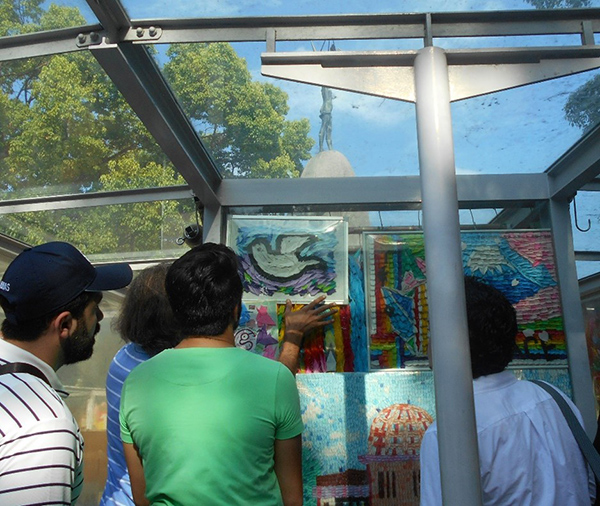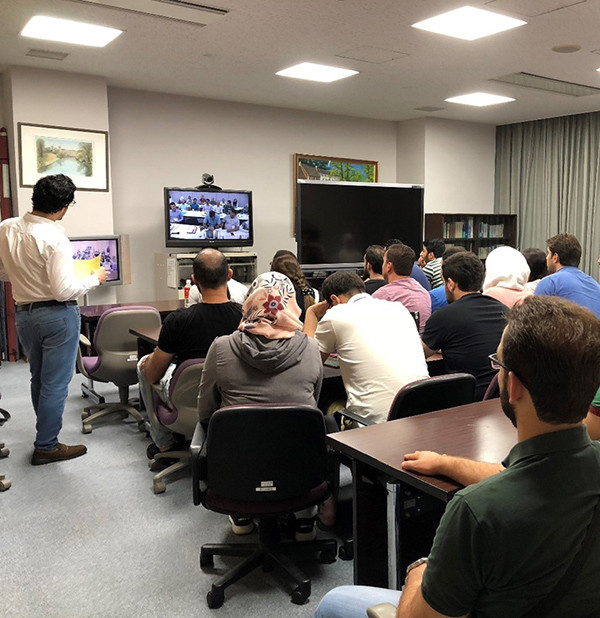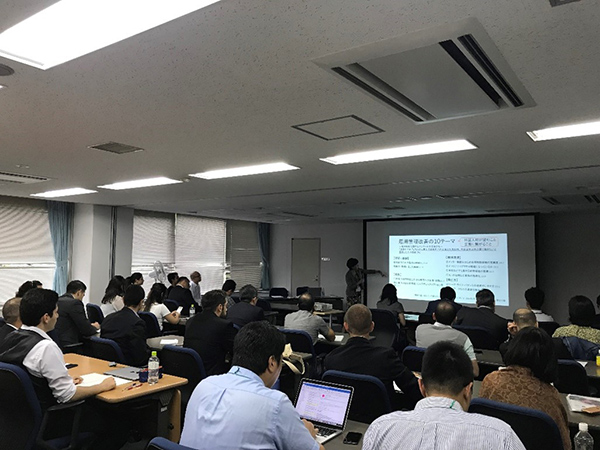Twenty participants and their families arrived in Japan from Jordan and Lebanon in August 2018 as the second round of the Japanese Initiative for the future of Syrian Refugees (JISR) program.
Although this was their first time to come to Japan (or even for the first time to fly for some of them), their determinations and expectations seemed to overcome their anxieties.
After arriving in Japan, the participants and their families participated in the post arrival orientation at JICA Chugoku Center in Hiroshima for one and a half months. Aside from Japanese language training, they learned about the Japanese lifestyle, traffic rules, disaster prevention, and other important things to know in order to live in Japan. Furthermore, they attended a peace training program by visiting the Hiroshima Peace Memorial Park highlighting the Peace Memorial Museum and the Atomic Bomb Dome. The participants enthusiastically observed the site while associating the restoration of Hiroshima after the war with that of their hometowns in Syria.
The day before visiting the Hiroshima Peace Memorial Park, the participants learned how to fold cranes in origami to learn about Japanese culture and devoted their origami art to the "Children's Peace Monument."

A participant devotes origami art with a crane motif to the "Children's Peace Monument" of Hiroshima Peace Memorial Park.
In the Japanese language training, the participants and their families practiced daily conversation not only in the classroom but also outside the center with Japanese people around in the area. When visiting Miyajima, they ardently asked questions and made conversations using Japanese words that they had just learned.
One day during the orientation, they had the chance to talk with the first round of participants who gathered in Tokyo through a TV conference. The new participants asked various questions ranging from university classes to children's nursery school expenses. In response, the first round of participants gave careful explanations based on their one-year experiences in Japan. As the session was conducted in Arabic, the participants and their families communicated well enough to address concerns about the life in Japan.

The second round of participants and their families listening to the advice of the first round of participants through a TV conference.
The participants completed their post arrival orientation in early September and left Hiroshima for their own university locations. Their new life has begun in many parts of Japan.
The first round of participants who came to Japan in 2017: Participation in the Business Fair and Japanese Program
One year after their arrival in Japan, the first round of participants attended at the Business Fair and Japanese Program held in JICA Tokyo at the end of August. That was a reunion opportunity for them after they left Hiroshima for their own universities in September 2017. The five-day program provided them with opportunities to meet with personnel in Japanese companies and also to blush up their commands of Japanese language in order to find jobs in Japan after completing their master’s courses. Especially in the Japanese Program they learned how to approach Japanese companies, how to appeal themselves to companies and also how to write a curriculum vitae in Japanese. Separate sessions were organized for their spouses to learn the Japanese language as minimum requirements for working in Japan.
The participants also had a chance to visit companies. One group visited a Japanese major electronics manufacturer where the group members acquired a wide range of knowledge including the latest scientific advancements from the history of the development of Japanese manufacturing. The other group visited a Japanese venture company with businesses in the Middle East. The participants of this group experienced an innovative working environment which was different from that of a typical Japanese manufacturer. At this company, an Indian engineer also explained his job descriptions and they could know how foreigner works in Japanese company.

Participants enthusiastically listening to a lecture on "Essential preparedness to work in Japan."
A total of sixteen companies joined the two-day Business Fair. Upon self-introductions of the companies, the participants could make inquiries directly to the attended companies and enthusiastically asked questions about their business activities. In addition, four participants who had previously undergone internship gave presentations which stimulated strong interest of other participants in terms of taking up internships.
On the final day, all the participants made presentations about their experiences and outcomes for this week. According to them, this was an exciting opportunity to gain knowledge on job-seeking activities in Japan which are completely different from those in Syria, Jordan and Lebanon. Above all, that was an excellent opportunity to learn what must to be done and acquired for successful job hunting in Japan.
As the participants will complete their respective master’s courses from June 2019 onwards, they are eagerly studying the essential Japanese for their employments in Japan while conducting their research activities in English every day.
(Natsuko Ozawa / Japan Development Service Co., Ltd)




scroll